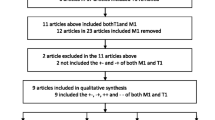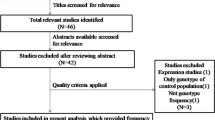Abstract
Glutathione S-transferase P1 (GSTP1) gene Ile105Val polymorphism has been suggested to be involved in the development of cancer. However, the results from the studies regarding the association between GSTP1 Ile105Val polymorphism and hepatocellular carcinoma risk have been inconsistent. Thus, we performed a meta-analysis to investigate the association. Published literature from PubMed, Chinese Biomedical Literature, and Wanfang databases was searched for eligible publications. Pooled odds ratios (ORs) with 95 % confidence intervals (95 %CIs) were calculated using random- or fixed-effects model. Six studies with a total of 1,843 participants were finally included into this meta-analysis. The results suggested there was no association between GSTP1 Ile105Val polymorphism and hepatocellular carcinoma risk under all genetic models (for ValVal vs. IleIle, OR = 0.79, 95 %CI 0.48–1.29, P = 0.341; for IleVal vs. IleIle, OR = 1.05, 95 %CI 0.84–1.30, P = 0.678; for the dominant model, OR = 0.91, 95 %CI 0.68–1.20, P = 0.498; and for the recessive model, OR = 0.76, 95 %CI 0.47–1.24, P = 0.269). Subgroup analyses by ethnicity showed there was also no association between GSTP1 Ile105Val polymorphism and hepatocellular carcinoma risk in Asians under all genetic models (All P values were more than 0.05), but GSTP1 Ile105Val polymorphism was associated with decreased risk of hepatocellular carcinoma in European under the recessive model (ValVal vs. IleVal/IleIle) (OR = 0.44, 95 %CI 0.20–0.98, P = 0.044). In conclusion, the meta-analysis suggests that there is little evidence for the association between GSTP1 Ile105Val polymorphism and hepatocellular carcinoma risk. However, more well-designed studies are needed to further assess this association.




Similar content being viewed by others
References
Forner A, Llovet JM, Bruix J. Hepatocellular carcinoma. Lancet. 2012;379(9822):1245–55.
Jemal A, Bray F, Center MM, Ferlay J, Ward E, Forman D. Global cancer statistics. CA Cancer J Clin. 2011;61:69–90.
El-Serag HB. Hepatocellular carcinoma. N Engl J Med. 2011;365:1118–27.
McCarver DG, Hines RN. The ontogeny of human drug-metabolizing enzymes: phase II conjugation enzymes and regulatory mechanisms. J Pharmacol Exp Ther. 2002;300:361–6.
Vasieva O. The many faces of glutathione transferase pi. Curr Mol Med. 2011;11:129–39.
Strange RC, Spiteri MA, Ramachandran S, Fryer AA. Glutathione-S-transferase family of enzymes. Mutat Res. 2001;482:21–6.
Townsend D, Tew K. Cancer drugs, genetic variation and the glutathione-S-transferase gene family. Am J Pharmacogenomics. 2003;3:157–72.
Ginsberg G, Smolenski S, Hattis D, Guyton KZ, Johns DO, Sonawane B. Genetic polymorphism in glutathione transferases (GST): population distribution of GSTM1, T1, and P1 conjugating activity. J Toxicol Environ Health B Crit Rev. 2009;12:389–439.
Tang YT, Li XP, Liu TQ, Yang JR, Luo JQ, Liang ZX. A study of genetic polymorphisms of glutathione S-transferase in patients with hepatocellular carcinoma. Zhong Guo Shi Yan Zhen Duan Xue. 2012;16:660–2.
Chen YL, Tseng HS, Kuo WH, Yang SF, Chen DR, Tsai HT. Glutathione S-transferase p1 (GSTP1) gene polymorphism increases age-related susceptibility to hepatocellular carcinoma. BMC Med Genet. 2010;11:46.
White DL, Li D, Nurgalieva Z, El-Serag HB. Genetic variants of glutathione S-transferase as possible risk factors for hepatocellular carcinoma: a huge systematic review and meta-analysis. Am J Epidemiol. 2008;167:377–89.
Ladero JM, Martinez C, Fernandez JM, Martin F, Garcia-Martin E, Ropero P, et al. Glutathione S-transferases pi 1, alpha 1 and m3 genetic polymorphisms and the risk of hepatocellular carcinoma in humans. Pharmacogenomics. 2007;8:895–9.
Munaka M, Kohshi K, Kawamoto T, Takasawa S, Nagata N, Itoh H, et al. Genetic polymorphisms of tobacco- and alcohol-related metabolizing enzymes and the risk of hepatocellular carcinoma. J Cancer Res Clin Oncol. 2003;129:355–60.
Liu CZ, Bian JC, Jiang F, Shen FM. Genetic polymorphisms of glutathione S-transferase m1, t1, and p1 on susceptibility to hepatocellular carcinoma. Zhongguo Geng Gong Wei Sheng. 2002;18:935–6.
Chen SY, Wang LY, Lunn RM, Tsai WY, Lee PH, Lee CS, et al. Polycyclic aromatic hydrocarbon-DNA adducts in liver tissues of hepatocellular carcinoma patients and controls. Int J Cancer. 2002;99:14–21.
Cochran WG. The combination of estimates from different experiments. Biometrics. 1954;10:101–29.
DerSimonian R, Laird N. Meta-analysis in clinical trials. Control Clin Trials. 1986;7:177–88.
Mantel N, Haenszel W. Statistical aspects of the analysis of data from retrospective studies of disease. J Natl Cancer Inst. 1959;22:719–48.
Egger M, Davey Smith G, Schneider M, Minder C. Bias in meta-analysis detected by a simple, graphical test. BMJ. 1997;315:629–34.
Hayes JD, Flanagan JU, Jowsey IR. Glutathione transferases. Annu Rev Pharmacol Toxicol. 2005;45:51–88.
Hayes JD, Strange RC. Glutathione S-transferase polymorphisms and their biological consequences. Pharmacology. 2000;61:154–66.
Strange RC, Fryer AA. The glutathione S-transferases: influence of polymorphism on cancer susceptibility. IARC Sci Publ. 1999;148:231–49.
Wang B, Huang G, Wang D, Li A, Xu Z, Dong R, et al. Null genotypes of GSTM1 and GSTT1 contribute to hepatocellular carcinoma risk: evidence from an updated meta-analysis. J Hepatol. 2010;53:508–18.
Lu S, Wang Z, Cui D, Liu H, Hao X. Glutathione S-transferase p1 ile105val polymorphism and breast cancer risk: a meta-analysis involving 34,658 subjects. Breast Cancer Res Treat. 2011;125:253–9.
Economopoulos KP, Sergentanis TN, Vlahos NF. Glutathione S-transferase M1, T1, and P1 polymorphisms and ovarian cancer risk: a meta-analysis. Int J Gynecol Cancer. 2010;20:732–7.
Economopoulos KP, Sergentanis TN. GSTM1, GSTT1, GSTP1, GSTA1 and colorectal cancer risk: a comprehensive meta-analysis. Eur J Cancer. 2010;46:1617–31.
Zhou Y, Li N, Zhuang W, Yin YQ, Liu GJ, Wu TX, et al. Glutathione S-transferase P1 gene polymorphism associated with gastric cancer among Caucasians. Eur J Cancer. 2009;45:1438–42.
Mo Z, Gao Y, Cao Y, Gao F, Jian L. An updating meta-analysis of the GSTM1, GSTT1, and GSTP1 polymorphisms and prostate cancer: a huge review. Prostate. 2009;69:662–88.
Chen X, Liang L, Hu X, Chen Y. Glutathione S-transferase P1 gene Ile105Val polymorphism might be associated with lung cancer risk in the Chinese Han population. Tumour Biol. 2012;33:1973–81.
Yao L, Ji G, Gu A, Zhao P, Liu N. An updated pooled analysis of glutathione S-transferase genotype polymorphisms and risk of adult gliomas. Asian Pac J Cancer Prev. 2012;13:157–63.
Zhao ZQ, Guan QK, Yang FY, Zhao P, Zhou B, Chen ZJ. System review and metaanalysis of the relationships between five metabolic gene polymorphisms and colorectal adenoma risk. Tumour Biol. 2012;33:523–35.
Zintzaras E, Lau J. Synthesis of genetic association studies for pertinent gene-disease associations requires appropriate methodological and statistical approaches. J Clin Epidemiol. 2008;61:634–45.
Yu L, Sun L, Jiang YF, Lu BL, Sun DR, Zhu LY. Interactions between CYP1A1 polymorphisms and cigarette smoking are associated with the risk of hepatocellular carcinoma: evidence from epidemiological studies. Mol Biol Rep. 2012;39:6641–6.
Conflicts of interest
None
Author information
Authors and Affiliations
Corresponding author
Rights and permissions
About this article
Cite this article
Zhao, Y., Wang, Q., Deng, X. et al. Quantitative assessment of the association between GSTP1 gene Ile105Val polymorphism and susceptibility to hepatocellular carcinoma. Tumor Biol. 34, 2121–2126 (2013). https://doi.org/10.1007/s13277-013-0695-1
Received:
Accepted:
Published:
Issue Date:
DOI: https://doi.org/10.1007/s13277-013-0695-1




